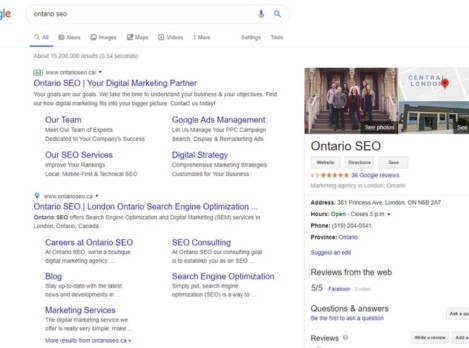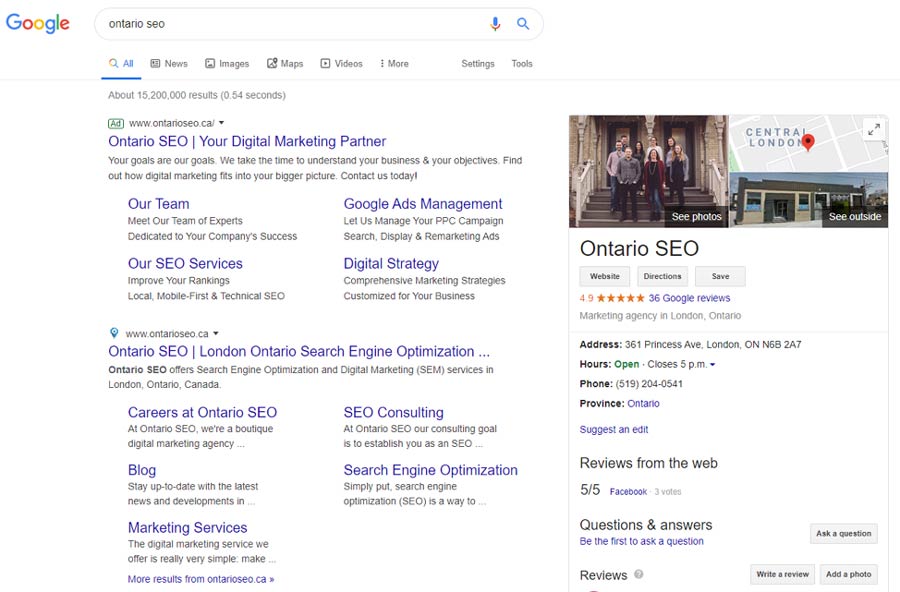A highly debated topic when it comes to paid search advertising (whether it be Google Ads or Microsoft Advertising) is whether or not you should bid on your branded keywords. Brand keywords (or brand terms) are search words or phrases that include your brand name or a variation of it. For example, “Ontario SEO” would be a brand term.
While most will agree that bidding on branded keywords has more positives than negatives, there are situations where this isn’t the case. Not all business cases are alike and there are multiple factors that can impact whether you bid on branded terms for PPC advertising. While this article will provide some bidding strategy guidelines, it is best to conduct thorough tests for bidding on brand keywords for PPC advertising and determine if the financial and time investment is worth it.by
6 Reasons Why Bidding on Your Brand Is Good
Achieve More Control
By bidding on your own brand terms, you gain a sense of control you don’t necessarily have with just organic rankings. Organic listings can be difficult and slow to adjust for specific search queries whereas search ads can be adjusted as frequently as you’d like. By bidding on your own brand terms, you can:
- Send users exactly where you want them to go on your website
- Change your messaging whenever needed
- Provide users with more information by using ad extensions (location extensions, call extensions, price extensions, etc.)
- Utilize site link extensions to promote products/services with low search volume
-
Protect the SERP from Competitors
Often, competitors will bid on your business’ brand terms which allows them to (sometimes) appear above your organic results. If they are shown first, no matter how much brand loyalty you have, you will start to see a decrease in click-through rate on your organic listings.
Bidding on your own brand keywords protects the space above your organic search results and will drive up the potential cost for your competitors. So long as your brand name is trademarked, your quality scores will naturally be much higher because other advertisers cannot include your brand name in their own ads. As a result, their ad relevance suffers, and they must substantially increase their bids to rank in a high position. This will usually cause your competitors to back off from bidding on your brand terms. -
Dominate Your Branded Search Results Page
The more real estate you have on the SERP, the higher your click-through rate will be. By bidding on branded keywords, you are able to show more listings for brand search terms. This allows you to push down review sites (which may or may not have negative reviews) as well as competitors’ ads.
Here is an example of a dominated brand search:
-
Receive Incremental Traffic
Google conducted a study called the “Search Ads Pause Studies” that revealed 89% of paid traffic to an advertiser’s site is lost and not recovered by organic clicks when a paid search is turned off. This proves that bidding on branded keywords helps increase the overall CTR for all your listings and can give you approximately 89% more clicks than you would achieve otherwise.
-
Bidding on Your Brand Name is (Relatively) Inexpensive
Since your quality scores will inevitably be very high for your own branded keywords and since the competition is (usually) low, you can expect to pay a very affordable cost per click (CPC).
Note: there are sometimes where this isn’t the case (as will be discussed later on). -
Gain Valuable Data on Branded Keyword Variations
When bidding on branded keywords (and not solely using an exact match), you can be given some useful insights in your search query report. This can reveal how users are using your brand name in searches and if they are attaching additional keywords to it (ex. location, product name, service name, employee, etc.)
By gaining this information, you can use it to enhance other aspects of your paid search campaigns as well as transfer some of this knowledge into your search engine optimization strategy.
3 Cases When You Shouldn’t Bid on Branded Terms
-
Paid Media Budget is Minimal
While bidding on branded terms is relatively inexpensive, it may not be worth it if you are working with a small PPC media budget. If you already have non-branded campaigns that are generating many conversions, it is probably best not to dilute this with a branded search campaign. However, running a test to see how adding in a branded campaign affects your overall performance is definitely worth conducting.
-
No Competition & Ranking #1 Organically
In the rare case that you are in a space where you have absolutely no competition and are dominating the search engine results page organically, there may be no need to bid on branded keywords. If you need to save on advertising spend, this is where it would make the most sense to do so. However, be cautious, as there could be other businesses monitoring your advertising efforts and could see an opportunity to bid on your brand if you’re not.
-
Large Volume of Returning Visitors
If your business offers after-sale service (for example, has a customer portal), it may not be best to bid on branded keywords. While it will increase your visibility, you are going to be paying for a lot of clicks from users who are already customers.
Conclusion
In conclusion, there are many perks when it comes to bidding on branded keywords that could have a significant, positive impact on your business. While there are some cases where bidding on branded terms should be avoided, it is best to run tests to come up with your own conclusion. The more data you have, the better you can optimize your media spend and determine which sort of campaign structure works best for your business.








